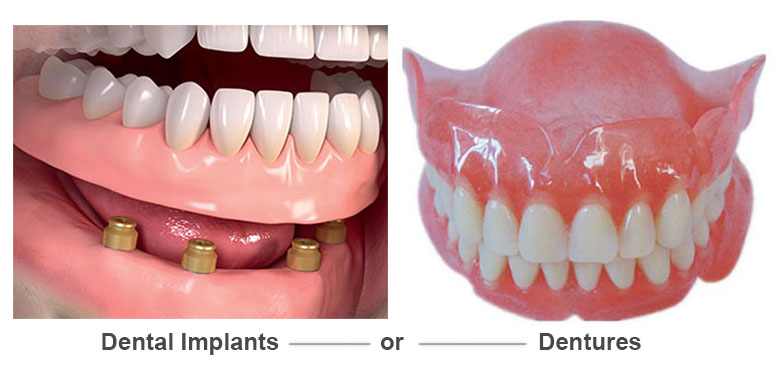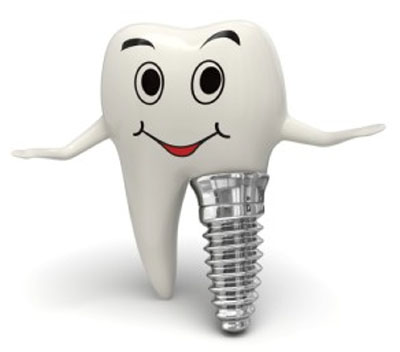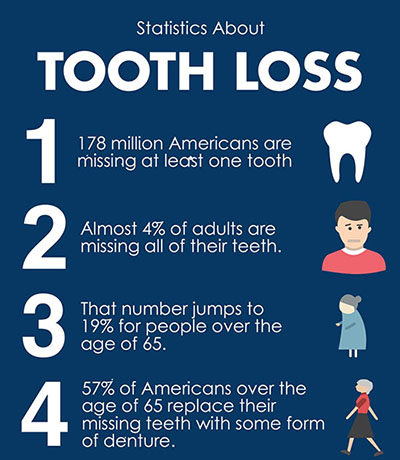According to the American Association of Oral and Maxillofacial Surgeons, the stats show that nearly 70% of adults aged 35 to 44 years in the United States have at least one missing tooth due to tooth decay, gum disease, dental fractures or an accident.
If you’re missing teeth or have been told you need various procedures, you’re probably already weighing the pros and cons of dental implants vs. dentures. The end result will appear to be the same, a beautiful smile, but the choice that’s right for you will depend on a few important factors. So, here is what you should know about the choice between dentures and implants, and which one would be the better decision for you.

Dentures, also known as false teeth, are fitted to a mouthpiece that is affixed to the gums with denture adhesive. They generally take some time to get used to, and your dentist may recommend soft foods along with speech practice for the first several weeks. Often, even in those people who have worn false teeth for a long time, dentures may continue to shift during eating and speaking and can therefore cause discomfort. They can also cause tooth decay in the healthy teeth that are next to the dentures, in the case of a partial set that is not fitted properly. For most people, dentures are not the best option for these reasons. But, those with a weak jaw or unhealthy gums might find dentures to be the most appropriate option.
Dentures have come a long way since the early days of bone and ivory. Dentures produced today are stronger and more natural looking than their early predecessors. However, even though the quality of dentures has improved dramatically, if your dentist suggests getting fitted for a set of dentures instead of dental implants, you should understand the reasons why. One big point to consider is that dentures can cause further damage to surrounding teeth and gums because they make the adjacent areas more susceptible to decay.
Dental implants are natural looking porcelain teeth that a dentist surgically installs into your jaw. With proper home maintenance and regular visits to the dentist, your implants can last for decades. Unlike dentures that are normally used to replace several teeth, you can opt to get only one or two implants, making them a popular choice. They don.t require any type of adhesive, however they can only be used with healthy jaws and gums. Naturally, dentists prefer implants because they offer a more comfortable, natural option for patients who need tooth replacement. Plus, they also don’t damage surrounding teeth or gums.
Implants sound like the best of the two alternatives, right? Still, implants, despite their clear benefits over dentures, can be expensive and many insurance companies won’t cover the entire cost. However, implants, for the right candidates, offer a likely lifelong solution that is comfortable, durable and safe.
Some insurance advice: If you are a good candidate for implants but your insurance coverage is minimal, ask your provider to use the denture allowance toward the implant instead. Also, if you use an in-network dentist, the cost for dental implants may be less than you think.

Whether you end up choosing dental implants or dentures, waiting is the absolutely the worst thing you can do. When you decide to delay treatment for any reason whatsoever, you are exposing yourself to the risk of bone decay and uneven wear on your teeth for starters. Dental restoration should not be taken lightly. In fact, it should be at the top of your priority list because it could affect the health of your other teeth, as well as your overall health. Also, most patients gain the benefit of brand new confidence when they get implants or dentures.
To discover which dental procedure is right for you, we ask you to contact our office to schedule an appointment today! At AMG Dental Group, we work hard to provide our North Palm Beach, Juno Beach and surrounding area patients with the finest dental care available. Call Dr. Adrian Guerra, DDS today at 561-844-6146.

